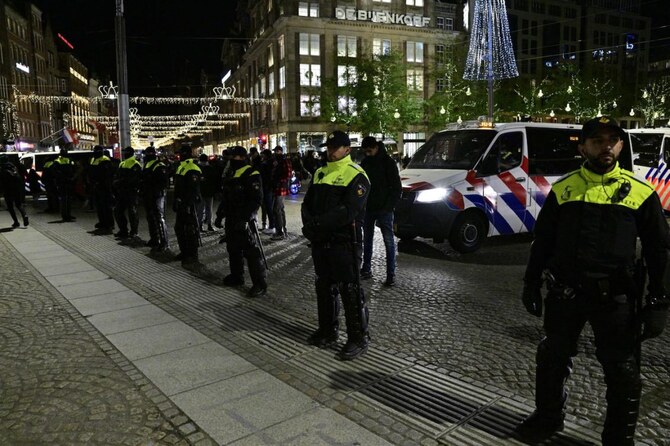AMESTERDAM: The trial opened Wednesday of five suspects facing charges including one of attempted manslaughter after last month’s hit-and-run attacks in Amsterdam on Israeli football supporters.
The men, ranging in age from 19 to 32, are to face a three-judge bench at the Amsterdam District Court in staggered appearances. Two more suspects are to appear on Thursday.
All seven have been charged with public violence, Dutch prosecutors said.
Supporters of Maccabi Tel Aviv were assaulted in the early hours of November 8 in various parts of the city.
The violence sparked outrage in Israel and among Dutch politicians, who described them as anti-Semitic.
The attacks followed two days of skirmishes that also saw Maccabi fans chant anti-Arab songs, vandalize a taxi and burn a Palestinian flag.
Police said they were investigating at least 45 people in connection with the violence, which saw five Maccabi fans briefly hospitalized.
First up before the judges Wednesday was a 19-year-old man from the town of Monnickendam, just northeast of Amsterdam, followed by four others.
The first man stands accused of committing public violence around the Johan Cruyff Arena, including shouting anti-Semitic slogans and throwing rocks at the police.
He also faces a charge of sharing information about public violence and illegal possession of fireworks.
Later Wednesday, a 22-year-old man from Son en Breugel, near Eindhoven, will appear facing the most serious charge of attempted manslaughter, prosecutors said.
The charge against him related to assaults near Amsterdam’s famous Dam square in the violence that followed the game between home team Ajax and Maccabi.
Apart from the seven suspects appearing this week, at least six others are also to face charges in connection with the violence on the night and its aftermath.
Three of these suspects are minors and their cases will be heard behind closed doors.
“Charges have also been laid against Maccabi fans, who displayed provocative behavior before the game,” the Dutch Public Prosecution Service said in a statement.
The incident and its aftermath left the freewheeling Dutch capital reeling — and its various communities polarized.
























